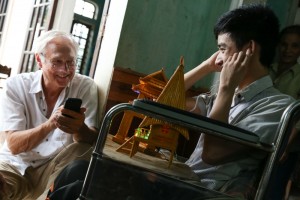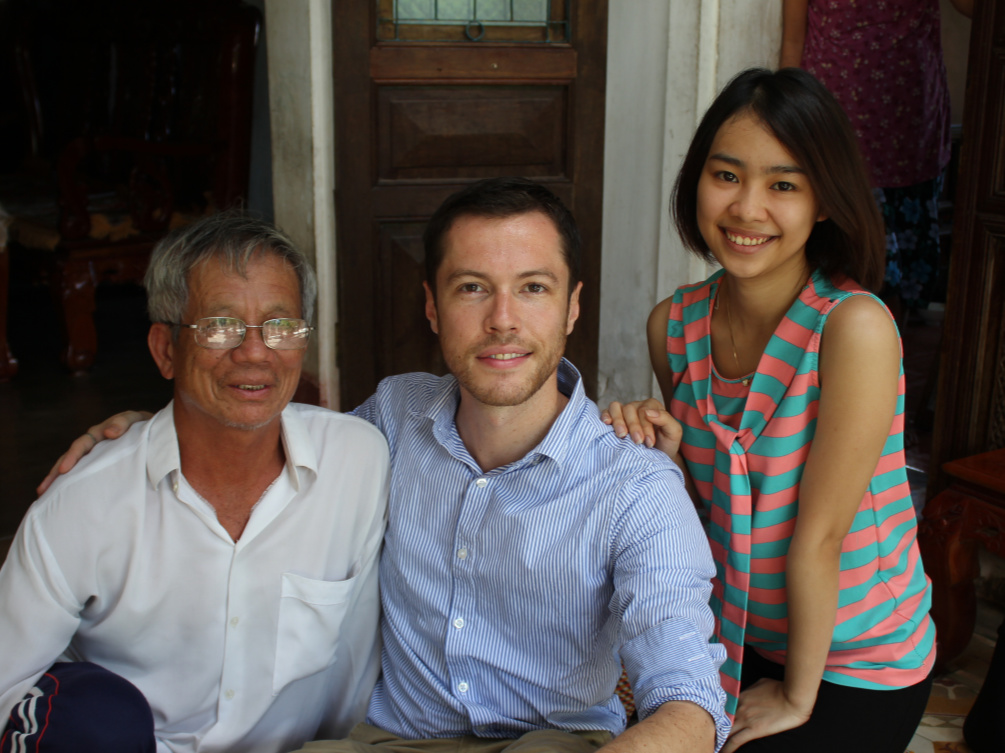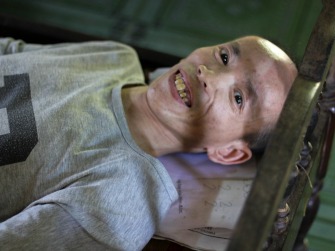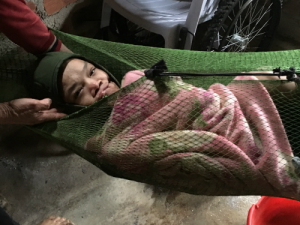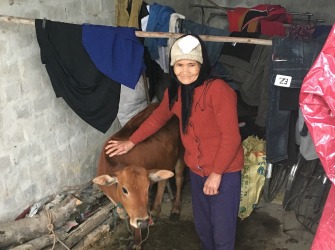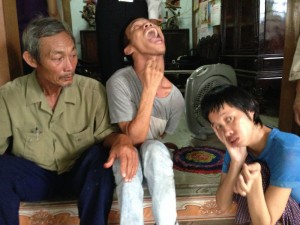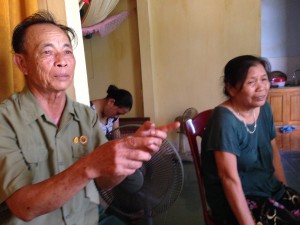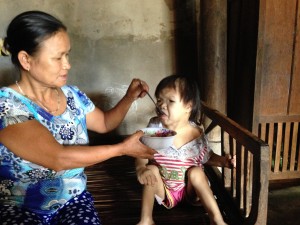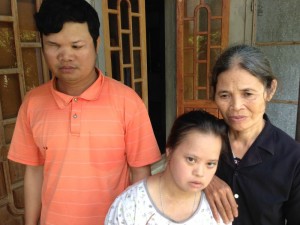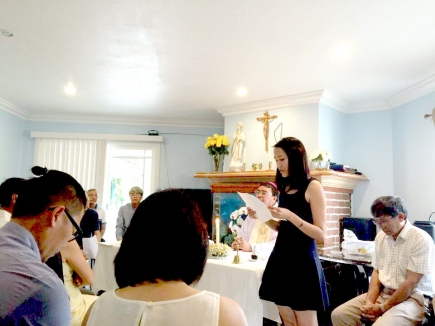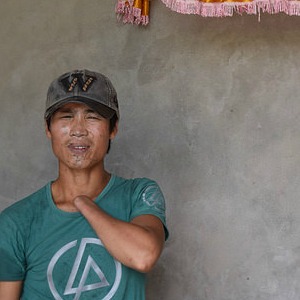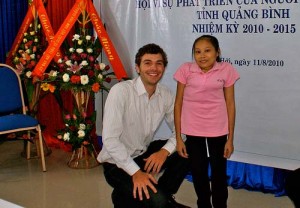Supporting Agent Orange Caregivers in Vietnam
Vision & Stakeholders
Vision
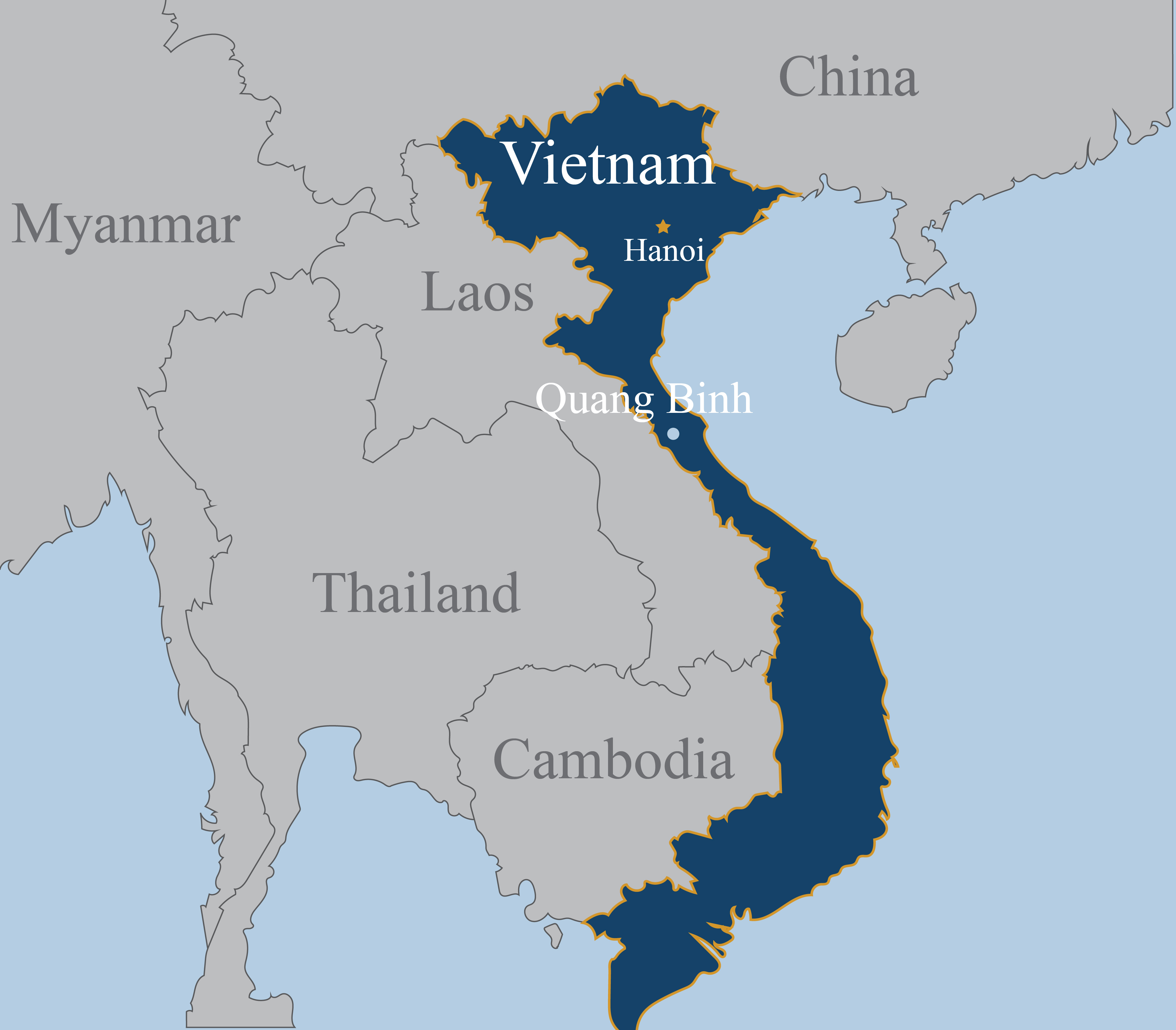 This startup is led by the Association for the Empowerment of Persons with Disabilities (AEPD) in Quang Binh province Vietnam. It supports families that have been devastated by Agent Orange, the dioxin-laden defoliant that was sprayed across much of Vietnam during the war. Quang Binh province alone has registered over 19,000 Agent Orange casualties.
This startup is led by the Association for the Empowerment of Persons with Disabilities (AEPD) in Quang Binh province Vietnam. It supports families that have been devastated by Agent Orange, the dioxin-laden defoliant that was sprayed across much of Vietnam during the war. Quang Binh province alone has registered over 19,000 Agent Orange casualties.
Our goal with this startup is to explain the human cost of Agent Orange and follow the stories of caregivers like Mai Thi Loi, pictured below. Three of Mai Thi Loi’s sons were so severely affected by dioxin poisoning that they have been chained up to prevent them from harming themselves and others. Like many Agent Orange caregivers, Mai Thi Loi is an aging widow. By easing the burden on her we support her family and community. As their profiles show, the caregivers are devoted, courageous, and hard-working.
Our program raises money for a limited number of vulnerable caregivers like Mai Thi Loi. The families have been chosen by AEPD on the basis of a 2014 survey in Quang Binh province that was financed by Scott Allen, an AP Board member. Once a family is selected by AEPD, we post their profile on these pages and seek funding for a cow or another form of sustainable investment. An AEPD outreach worker then helps the family to prepare a business plan and follows up with regular visits. AP also follows up through staff visits, and by sending a Peace Fellow to volunteer at AEPD during the summer. Several Peace Fellows have raised significant amoints for the families through crowd-funding: Ai Hoang (2016); Jacob Cohn (2017); and Marcella de Campos (2018). We are deeply grateful to them all.
Our long-term goal is to help AEPD produce a model of sustained support for Agent Orange families that could eventually be used on a much larger scale. This is happening in three ways. First, AEPD is providing community support and admitting Agent Orange caregivers to its highly successful self-help groups. Second, we are finding that a cow can produce a serious income that can even cover medical costs. Third, in taking possession of a cow, the families are required to develop a business plan with help from an AEPD outreach worker. In time, we hope, this will make them more credit-worthy, and open the door to agricultural credit and other government support. This is particularly important for third generation victims of Agent Orange and veterans who joined up after the war ended – neither of whom qualify for government compensation.
However this startup evolves, it will remain firmly focused on the caregivers and their families. (February 2020)
Beneficiaries
|
|
|
Visit the Profiles tab to meet more stakeholders.
Background
Background
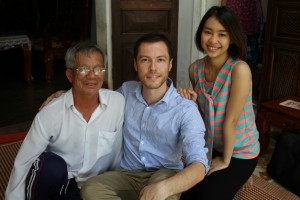
Seth McIntyre, center, a graduate student at Brandeis University. helped AEPD organize the first-ever needs assessment of 500 Agent Orange victims in Quang Binh province.
The Association for the Empowerment of Persons with Disability (AEPD), AP’s partner in Vietnam, has worked with survivors of Agent Orange (AO) in Quang Binh Province for several years. Several Peace Fellows who have served at AEPD have also visited survivors and been inspired by their resilience. They included Simon Klatschi (2010), who profiled Mrs. Nguyen Thi My Hue, with her beautiful singing voice; and Kelly Howell, who was the first to meet the redoubtable Le Thanh Duc and the Phan siblings.
In 2014, AP and AEPD asked Peace Fellow Seth McIntyre to coordinate a questionnaire of 500 families that were receiving compensation from the government for Agent Orange in the province of Quang Binh. The survey came to an important conclusion: while the needs of victims are great, the burden of Agent Orange falls most heavily on the caregivers who have to support damaged children while also struggling to provide for the whole family. Many are aging widows.
As a result, in 2015 AEPD and AP decided to focus on the special needs of caregivers. AEPD identified eleven severely-affected families in Quang Binh and arranged for Peace Fellow Armando Gallardo and Iain Guest from AP to visit each family in the company of an AEPD Outreach Worker. Armando and Iain produced the profiles and photos on these pages, and AP began seeking funds for each family, as their profile was posted. AEPD outreach workers drew up a modest budget based on the needs of caregivers.
Our 2016 Peace Fellow Ai Hoang helped AEPD to manage the program through to the end of 2016 – and raised funds for three families through online appeals. Ai’s father visited AEPD during a trip to Vietnam and completed the funding of Le Tien Dung and his wife, who lost 12 children to Agent Orange. This rounded off a remarkable gesture of reconciliation by Ai’s family, which had left Vietnam years earlier as refugees.
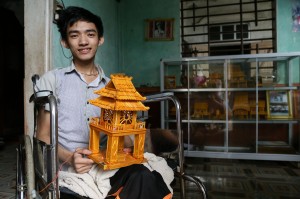
Victims: Dioxin poisoning stole up on Tuan in his mid-teens. Prevented from attending school by his illness, Tuan made model buildings from chopsticks until hemophilia landed him back at the hospital in 2017. Read his story here.
In 2017, the torch passed to Peace fellow Jacob Cohn. Jacob visited the four families that had received funding and updated their profiles. He also met with the family of Thanh Thi Thao, which has been funded from AP’s core program and started his own online appeal for a sixth family, Duong Thi An, and her three children. Jacob reached his target by the end of July and accompanied AEPD outreach workers when they went to help the family draw up a business plan. Jacob also helped AP launch an appeal for the family of Phan That battered by Agent Orange and by climate change.
These dedicated Peace Fellows have helped AEPD and AP to develop an entirely new approach towards the challenge of Agent Orange. We will remain focused on the needs of individual caregivers, and bring their story alive. With AEPD’s help, we will continue to identify new families in need and raise modest amounts of money for them. At the same time, we will also check up regularly on past beneficiaries and do what we can to help – knowing that it will be downhill for most of them, as the parents grow older and the children gradually deteriorate.
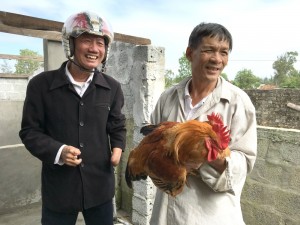
Peer Support: AEPD outreach workers like Nguyen Van Thuan (left) were wounded during the war. This helps them to better understand the needs of AO survivors.
This approach differs from that of other much larger AO programs which seek to clean up “hot spots” that were heavily sprayed or to strengthen medical systems. We want people to identify with these families on a human level, and to invest in them.
Given the immensity of the Agent Orange tragedy – 3 million Vietnamese affected – ours is a tiny contribution. But by helping these families we also strengthen AEPD’s outreach workers who were themselves wounded in war and now provide indispensable peer support to these damaged families These remarkable people are featured later in these pages and their unique model of peer support needs to be made more widely available. We hope this campaign will help.
Finally, there is the personal impact on all of us working in close quarters with these family members. This is remarkably humbling and we emerge better people for it.
Challenge
Challenge
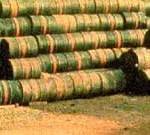
The challenge: Dioxin from Agent Orange has poisoned up to 3 million Vietnamese and placed a heavy burden on caregivers. Read the reports from the Aspen Institute.
Between 1960 and 1972 US planes dropped 11.4 million gallons of dioxin-laden Agent Orange (AO) over the south of Vietnam and parts of Laos and Cambodia, at a level of concentration many times greater than that recommended for commercial use.
The dioxin entered the food chain, triggering a wide array of medical conditions and cancers in Vietnamese and American service-members and their families. The Vietnamese Red Cross has estimated that over 3 million Vietnamese are affected.
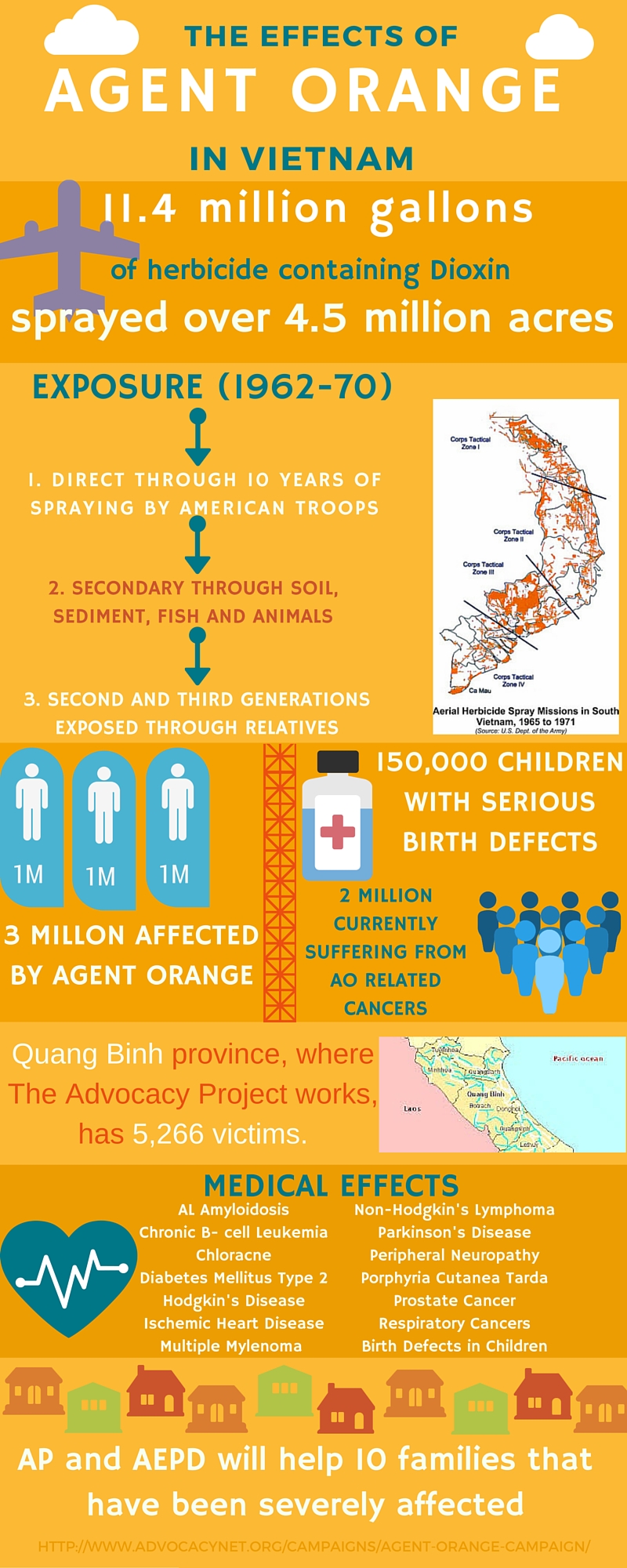 Agent Orange has long complicated relations between the governments of the US and Vietnam. In 2007, advocates from Vietnam and the US laid the basis for a less recriminatory approach by establishing the US-Vietnam Dialogue Group on Agent Orange/Dioxin. Presidents Obama and Truong Tan Sang built on this by developing a new “comprehensive partnership” in July 2013 that included a commitment to clean up heavily sprayed “hot spots,” including the former airports of Da Nang and Bien Hoa.
Agent Orange has long complicated relations between the governments of the US and Vietnam. In 2007, advocates from Vietnam and the US laid the basis for a less recriminatory approach by establishing the US-Vietnam Dialogue Group on Agent Orange/Dioxin. Presidents Obama and Truong Tan Sang built on this by developing a new “comprehensive partnership” in July 2013 that included a commitment to clean up heavily sprayed “hot spots,” including the former airports of Da Nang and Bien Hoa.
While any action was welcome, Vietnam’s AEPD felt that this approach focused too much on the environment and too little on people. The policy also sidestepped the real problem: veterans who had been exposed to spraying in the hot spots had carried the poison back to their families across Vietnam. This crisis was nationwide.
Senator Patrick Leahy took the lead in pushing for a broader policy and in 2015 the Senate released $20 million to USAID to support several pilot programs in Vietnam. The funds were divided between southern provinces (Dong Nai, Tay Ninh, Binh Phuoc, and Binh Dinh) and the central and northern provinces (Quang Nam, Hue, and Thai Binh). In addition, USAID sought to make medical services more accessible to victims of Agent Orange.
While this expansion was welcome, it still focuses largely on provinces that were heavily sprayed. For example, Quang Binh (which was lightly sprayed – 3,800 gallons) was omitted, even though a 2013 survey by AEPD and the government found that 5,266 AO victims were living in the province.
The USAID approach also focuses mainly on the needs of victims. While the medical needs are great, AEPD argues that the burden falls on the entire family, particularly the caregivers. This emerged from a 2015 survey conducted by AEPD and AP. As veterans die off, the burden of caring for their severely affected children falls on aging widows.
As AEPD and AP have dug deeper into the tragedy of AO, other problems have emerged. The Vietnamese government compensates AO victims, but the amounts are often inconsistent and insufficient. Furthermore, third generation victims (grandchildren) do not qualify.
When they met in September 2015 to consider the results of the AEPD/AP survey in Quang Binh, several members of the survey team expressed the hope that these policy issues could be raised with the central government.
Response
Response
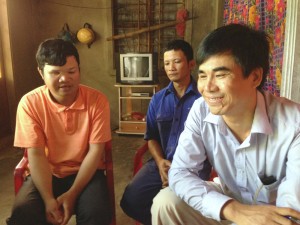
In touch again: Le Quoc Huong (left) an Agent Orange victim, first met Luong Thanh Hoai (right), at an eye hospital in Hanoi in 1988. Today, Mr. Hoai advises Luong’s family as an AEPD outreach worker.
AEPD’s Agent Orange campaign rests on the sturdy shoulders of outreach workers who have themselves recovered from the wounds of war and dedicated themselves to helping others.
AP Fellows have got to know these remarkable individuals well through the years. In 2010, Peace Fellow Simon Klantschi wrote a glowing blog on Luong Thanh Hoai, who lost his left arm and right eye during the war against China in 1988. A man of rare determination and talent, Luong Thanh Hoai, won a silver medal in the javelin and discus at national games. He and Simon became close friends.
Five years later, Luong Thanh Hoai was back on the front lines, helping to identify Agent Orange families in the district of Le Thuy, which he covers for AEPD. In a strange twist, he also met an old acquaintance while introducing AP to the family of Mrs. Duong Thi An, one of the caregivers profiled on these pages. Mrs. An’s second son, Le Quoc Huong, appears to have lost his eyesight to Agent Orange. He began to encounter problems with his eyes around the age of ten and receives Agent Orange compensation from the government. After several operations, he is almost blind.
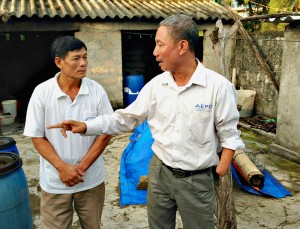
Veterans together: Le Thanh Duc, left, an Agent Orange victim, gets sage advice from Outreach Worker Nguyen Van Thuan
As fate would have it, Le Quoc Huong passed through the eye hospital in Hanoi in 1988, around the same time that Luong Thanh Hoai, the AEPD outreach worker, was brought in for an emergency eye operation after being wounded. They were then reunited when Mr. Hoai started working in the district in 2013. This helps to calm the younger man. “After talking with me the son is more confident,” says Mr. Hoai. ” He is not afraid to talk to strangers. Also, we help to break down the barriers with their neighbors.”
We saw the same chemistry at work when Nguyen Van Thuan, another AEPD outreach worker, took us to meet AO families in Bo Trach district. Mr. Thuan lost an arm and most of his second hand to unexploded ordnance (UXO) and had only recently begun to work with Agent Orange families. As a former veteran himself, he expressed admiration for the families: “To suffer from dioxin poisoning is a mark of courage. It means you fought bravely in the war,” he says. One of his clients, Le Thanh Duc, who is struggling to care for three severely disabled daughters and a depressed wife, listened carefully as his fellow veteran gave him advice on how to sell his fish sauce (photo).
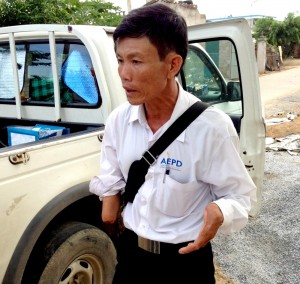
Outreach Worker Loan Van Thai
Loan Van Thai, a third AEPD outreach worker who helps Agent Orange families, had a terrible war. He lost his right hand and suffered severe wounds in a leg after being shot at from the air. He then spent 6 years in a Hanoi hospital while doctors tried to save his leg, and emerged with one leg significantly shorter than the other.
A true survivor, Mr. Thai feels that he is stronger because of his ordeal, and better able to provide peer support to the Agent Orange families. “Some victims won’t talk to normal people,” he says. “There are special ways to communicate with people with disabilities. To encourage them I tell them my story, about the time I had to be brave. I can also help them to get special medical care.” When his own spirits start to flag, Mr. Thai goes fishing.
Part business advisors and part personal counselors, these outreach workers serve as a bridge between the Agent Orange families and government services. We hope that this campaign will help to cover their costs and enable AEPD to recruit more like them.
Results
Results
|
|
|
|
|
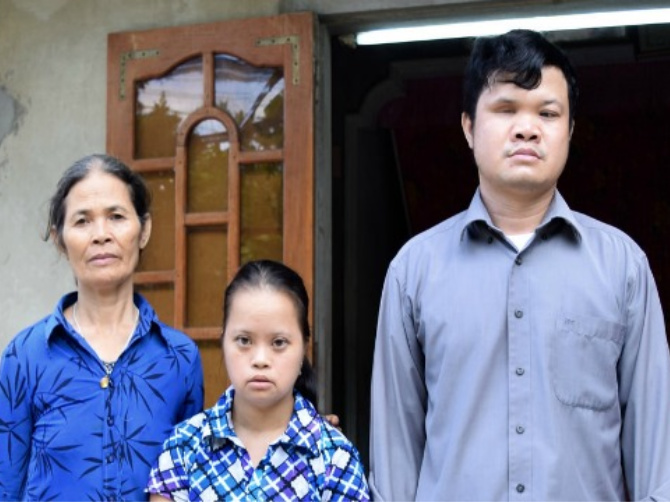
August 14, 2017: Mrs. An receives a buffalo and calf.Duong Thi An is the sixth Agent Orange caregiver to benefit from an AP appeal. She is seen here getting the good news from Peace Fellow Jacob Cohn, who is volunteering at AEPD as a Peace Fellow. Jacob has raised $1,500 for Mrs. An. This will pay for a buffalo and calf, which will allow Mrs. An – a widow – to earn a steady income and start paying the costs of eye surgery for her second son, Huong. Click here for the family profile. |
November 1, 2016: Le Thanh Duc buys chickens!Le Than Duc, left, is the third Agent Orange caregiver to receive funds through the AP appeal. He plans to raise three pigs and 80 chickens in his backyard, where he can also keep an eye on this three daughters. Chickens are in high demand and he could earn $1,400 a year if they all stay healthy. Mr. Duc has received loans from AEPD in the past to produce fish sauce. But that business collapsed in April 2016 after a steel company poisoned the sea and killed fish. He is optimistic about his chickens. |
|
September 29, 2016: Mai Thi Loi and her new buffalo.Left: Mai Thi Loi’s struggle with Agent Orange has touched many friends of AP, who have given generously to an appeal by Peace Fellow Ai Hoang. AEPD and Mai Thi Loi have used the funds to purchase a buffalo named Opportunity, seen here with Mai Thi Loi and her youngest son Hung. Mai Thi Loi rents the animal out for farm work and after a month she had already doubled her income. As Ai Hoang points out in this blog this will ease Mai Thi Loi’s money worries. But it does not resolve her deeper worry – that her two other sons are chained up to restrain their rage. |
|
September 1, 2016: The Xoan family gets a buffalo!Left: The first of ten Agent Orange families supported by AEPD and AP receives a buffalo to help Mrs. Pham Thi Doc and her husband Nguyen Van Xoan work their land and produce rice. The animal was bought with funds raised by Peace Fellow Ai Hoang. Outreach workers from the AEPD will advise the family on their investment. Read this report by Peace Fellow Ai Hoang, who raised funds for the family. |
|
Profiles
Supported families
|
|
|
|
|
|
|
|
|
|
|
Team
The AEPD Team
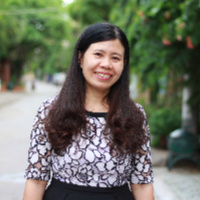
Ms. Nguyen Thi Thang Hong, ChairpersonMs. Hong is the chairperson of the Association for Empowerment of Persons with Disabilities (AEPD). As the chairperson she provides general guidance for the organization, coordinates with donors, and reports to the Executive Board as well as the provincial congress. Ms. Hong is responsible for overseeing program implementation, conducting advocacy, and developing partnerships. Prior to her position as chairperson, she worked as the Operations Manager to Survivor Corps/Landmine Survivor Network (LSN) in Vietnam–liaising between the organization’s local administration, network staff, and relevant district and provincial authorities on LSN’s operations. In addition to the vast technical expertise acquired during her time with LSN, the skills she cultivated by working in the Foreign Relations Section of the Office of Quang Binh Provincial People’s Committee and the Foreign Affairs Department of the International Cooperation Section have been paramount to her success at AEPD. As a result, Ms. Hong actively works toward AEPD’s mission to improve the quality of life of persons with disabilities everyday by bridging the gap between projects and policies by consulting with all stakeholders sustainably. |
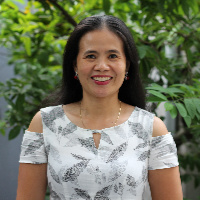
Ms. Nguyen Thi Phuong Hao, Program ManagerMs. Nguyen Thi Phuong Hao is the program manager at the Association for Empowerment of Persons with Disabilities (AEPD). Ms. Hao earned a Master of Arts in Environment, Society and Development at the National University of Ireland in Galway. As the program manager she is responsible developing future programs and proposals and managing, coordinating, and implementing currently funded projects. Prior to working at AEPD, Ms. Hao served as the project coordinator for the German International Cooperation (formerly the German Technical Cooperation) to ensure that a conservation-oriented development framework was being used in the Phong Nha Ke Bang region. Her other professional experience includes working for Counterpart international Vietnam. At the core of her expertise is development and implementation of projects for vulnerable and marginalized persons. She translates this experience to AEPD seamlessly, determinedly developing innovative projects that support intersectional development for persons with disabilities and their networks. |
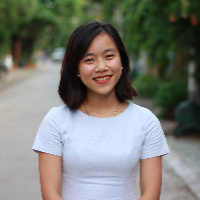
Ms. Le Thi Mai Ngoc, Project Coordinator and Monitoring and Evaluation OfficerMs. Ngoc is the project coordinator and the monitoring & evaluation officer at the Association for Empowerment of Persons with Disabilities (AEPD). Since graduating in 2015 with a law degree from the University of Economics and Law in Ho Chi Minh City, Ngoc has supported AEPD by facilitating legal procedures, managing, monitoring, and evaluating projects. As a coordinator, she directly implements grants that provide capacity-development and vocational training support to women with disabilities, landmine survivors, Agent Orange caregivers, and children with disabilities in Quang Binh province. She is responsible for volunteer coordination and is the Outreach Workers’ point of contact. By working directly with AEPD’s Outreach Workers and persons with disabilities (PWDs) through field visits, Ngoc has cultivated a strong skillset and understanding of approaches to working with and interventions for PWDs. She is passionate about empowering all persons with disabilities and hopes to take part in creating a society where these vulnerable populations can harness their agency, live more independently, and thrive. |
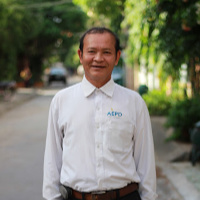
Mr. Truong Minh Hoc, Outreach WorkerMr. Hoc is an Outreach Worker for the Association for Empowerment of Persons with Disabilities (AEPD). He joined the Vietnamese army in 1977, after the American War ended. Part of his job was to clean up remaining dioxin barrels in the region. As a result, he was exposed to dioxin poison–Agent Orange. He became a Commander of the Company and Battalion by the Army Officer College of Corps 678 in 1983. In 1984, Mr. Hoc was shot in his right leg in Laos. His recovery in in Hanoi lasted six years and eight surgeries. After his recovery, Mr. Hoc began working as an Outreach Worker for AEPD’s predecessor, Landmine Survivor Network, in 2006. He firmly believes that persons with disabilities should support one another to develop resiliency, social inclusion, and better opportunities. Since 2006, Mr. Hoc has successfully completed 13 trainings on monitoring and evaluation, TOT training’s on community-based disaster risk management, working with children with disabilities, startup and business development, community-based rehabilitation, and supporting persons with disabilities with health care from organizations such as AEPD, Plan International, Give2Asia, James Madison University, and the Center for Rural Development in Central Vietnam. He is one of the most direct lines from AEPD to beneficiaries. Mr. Hoc’s commitment to AEPD’s mission and persons with disabilities are invaluable. For more information about Mr. Hoc, click here. |
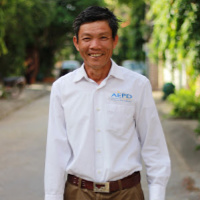
Mr. Hoang Van Luu, Outreach WorkerMr. Luu is an Outreach Worker for the Association for Empowerment of Persons with Disabilities (AEPD). In 1971, at seven years old and four years after a B-52 bomber in an airstrike in the American War killed his parents, Mr. Luu became a victim of an unexploded ordinance (UXO) accident. He lost his right forearm and three fingers on his left hand. After the accident, Mr. Luu found it quite difficult to acclimate to life. As a result, Mr. Luu strived to create a different life for himself. His hard work paid off when he tested into Hue University, one of the top schools in Vietnam, to study biology. Due to unforeseen circumstances, Mr. Luu left Hue University and learned various trades such as animal husbandry and stove building. To solidify his socio-economic independence he pursued a career in construction. Impressed by him, the Landmine Survivor Network recruited him to become an Outreach Worker in 2003. He has been a dedicated member of the team and has supported countless persons with disabilities and their families for the past 15 years. For more information about Mr. Luu, click here. |
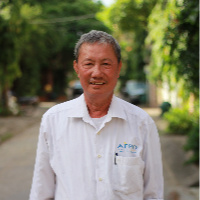
Mr. Nguyen Van Thuan, Outreach WorkerMr. Nguyen Van Thuan is an Outreach Worker for the Association for Empowerment of Persons with Disabilities (AEPD). In May 1978, Mr. Thuan became an engineer for the Vietnamese army. Three months later he embarked on a mining mission in Cambodia where a landmine accidentally exploded in his hands, blowing up his entire left hand and three fingers on his right hand. He returned from the mission defeated and unemployed. Upon returning he adapted his quotidian to his disabilities, taught himself how to drive a motorbike, and opened up a small sugar cane juice business. The recovery was physically and emotionally challenging. Mr. Thuan started as a security guard for the Landmine Survivor Network in 2003. He soon realized he |
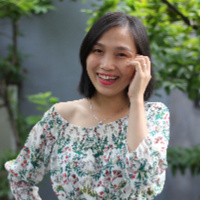
Ms. Nguyen Thi Thao, AccountantMs. Nguyen Thi Thao is the accountant for the Association for Empowerment of Persons with Disabilities (AEPD). Since joining the AEPD team she focuses on managing and controlling the organization’s bank accounts. She also helps to develop budget proposals, study and analyze financial requirements of donors, helps with monitoring revenues and expenditures to ensure that all expenses in the organization are in accordance with principals and financial regulations. She also maintains and prepares all tax and financial reports and contracts. Ms. Thao is an essential part of helping the AEPD team organize their budget and finance procedures. |
Supporters
Resources
Resources from APNews BulletinsRemembering Nguyen Van Tuan, 23, Victim of Agent Orange September 14, 2018 Horror and Heroism as Vietnamese Confront the Legacy of Agent Orange September 13, 2017 Cows and Courage Keep Agent Orange at Bay in Vietnam November 14, 2016 Peace Fellows to Tackle the Legacy of War and Disaster June 9, 2015 Agent Orange Lives on in Vietnam, Poisoning Children and Ruining Lives September 2, 2014 Peace Fellows to Take on Agent Orange, War Rape and Plastic Pollution June 6, 2014 Empowering Persons with Disabilities in Bangladesh, Uganda and Vietnam August 16, 2011 |
Peace Fellow Blogs
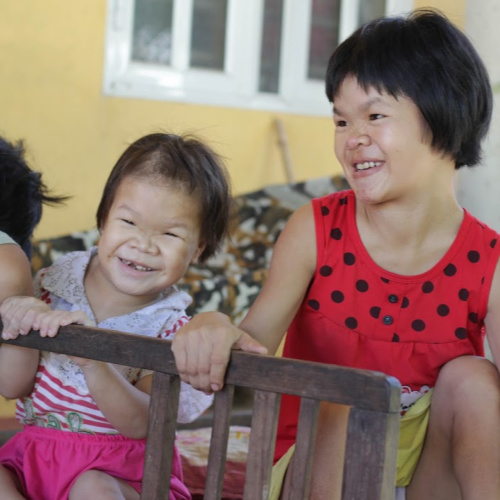 Click here to see Marcela’s photos |
Marcela De Campos’ Blog (2018)Marcela documented her visits to all eleven families that received grants from AEPD and AP, giving thorough updates to how the families have been doing since the grant and where they plan on going from here. |
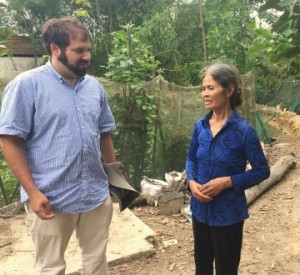 Click here to see Jacob’s photos |
Jacob Cohn’s Blog (2017)Jacob wrote 17 thoughtful blogs during his ten weeks at the AEPD. His blogs describe his visits to the six families that have received funding through AP and describe his own feelings as a young American at viewing the lasting legacy of the Vietnam War. Jacob raised $1,500 for the family of Ms. Anh, seen in the photo and trained a volunteer, Dat, to manage the AEPD website. His blogs are a must-read for anyone interested in conflict. “We haven’t really reckoned with Agent Orange as a society, but it’s not too late.” |
|
Click here to see Ai’s photos. |
Ai Hoang’s Blog (2016)Ai Hoang launches AP’s fundraising for four families “As I finish my second week here of AEPD, I’m reminded once again that there are never any real winners in war. The losses are great on all sides and the consequences continue to affect generation and generation of innocents to come. So here I am, doing what I believe is best to assist with the healing process.” |
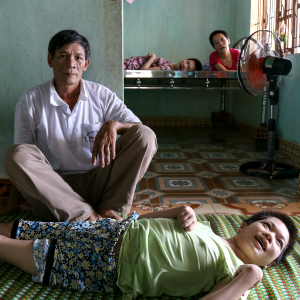 See Armando’s photos by clicking here. |
Armando Gallardo’s Blog (2015)Armando visits the eleven families with Iain Guest from AP and produces strong photos and profiles that will be used by AP for web pages and appeals. “When Mr. Dung first told us his story, it sounded as something that was coming from one of the many documentaries done about Agent Orange; His wife, who also helped during the war by building roads, had 13 children and out of all of them only 1 made it alive. The rest of them didn’t make it more than 8 months.” |
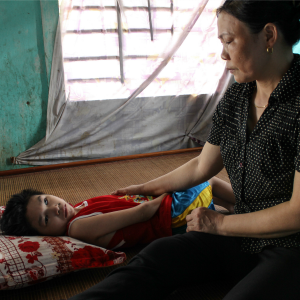 Look at Jefferson’s photos by clicking here. |
Seth McIntyre’s Blog (2014)Fellow Seth McIntyre is hired by AP and AEPD to develop a questionnaire and organize a survey of 500 affected families. The costs of the survey are covered by Scott Allen, an AP Board member. Seth also produces several powerful profiles on veterans and their families which help to explain the compensation policy of the Vietnamese government. Seth’s superb photos of the veterans receive over 12,000 views. “Luan asks me if I want to take pictures of the purple, cauterized scar running the length of his chest and another from his ankle to his upper thigh, his constant reminder of the wages of life. But this didn’t matter, at least, not now it doesn’t.” |
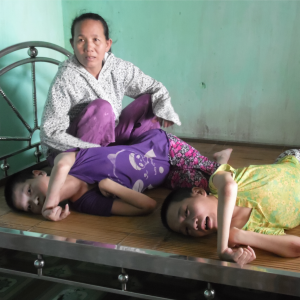 Click here to see Kelly’s photos. |
Kelly Howell’s Blog (2013)Kelly Howell is the first Fellow to study the devastating impact of dioxin poisoning, particularly on the second generation. Kelly also introduces AP to the family of Le Thanh Duc. “I met with several families who were affected by Agent Orange. Only in the last decade have people in the rural areas of Vietnam begun to hear about AO. Until then, they had no idea what was happening in some of the families there. Their stories were heart-rending yet hopeful, and I’d like you to meet some of the families that I met.” |
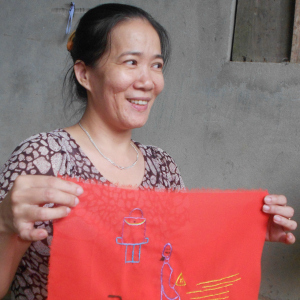 Click here to see Jesse’s photos. |
Jesse Cottrell’s Blog (2012)Fellow Jesse Cottrell produces an excellent video on the three Phan siblings, who have built a thriving hairdressing business. Jesse’s video is tweeted by, among others, the actor Alec Baldwin. “On the plane, I was seated next to an elderly Vietnamese woman, who threw me curious glances. Her eyes peered merrily at me over the top of the mask, and upon landing, she gave me a hearty high five. I thought to myself that she likely had memories of the wars here. Here I am, I thought, an American in post-war Vietnam, what will people think of me? Her high-five said to me, hey, welcome!, and I’ve encountered that same sentiment again and again, here in the quaint city of Dong Hoi.” |
Simon Kläntschi’s Blog (2011)Simon Klantschi, from Switzerland, is the first Fellow to meet with Agent Orange survivors. read his blog about the inspiring Mrs. Hue, who sells beer and wants to be an opera singer. “Nguyen Thi My Hue was born disabled. She has a serious congenital malformation, is humpbacked and has experienced an abnormal growth of her body. Today, at the age of thirty, she is only tall like a ten-year-old child. Hue is a victim of Agent Orange. Hue begins her story with: ‘I was born unlucky,’ but her eyes are bright and she smiles.” |
Advocacy Quilts
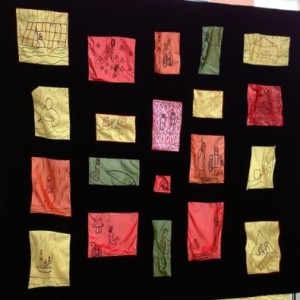 |
Peace Fellow Jesse Cottrell (2011) helps two members of AEPD who were injured during the Vietnam War to describe the impact of climate change on persons with disability. Their delicate squares are made from chiffon and silk and are assembled in the US by quilter Teresa Orr to be shown against the light. The Vietnam Disability Quilt has been widely shown at exhibitions in the US.
|
AEPD Youtube Videos

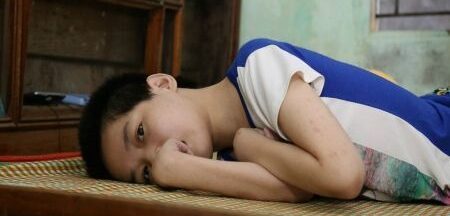
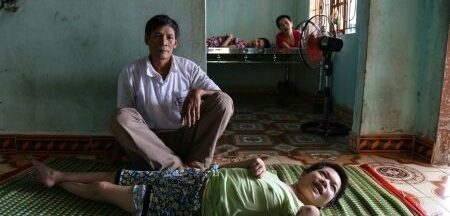
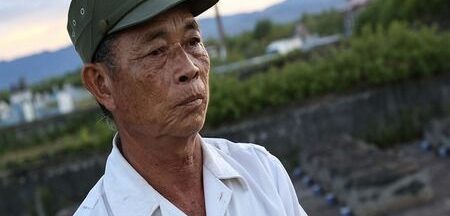
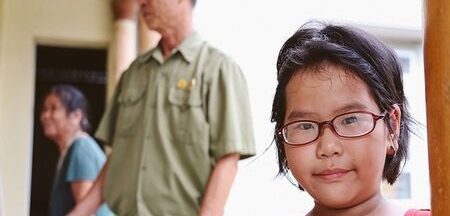
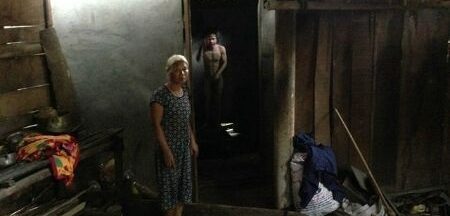
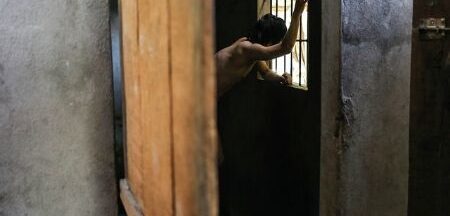
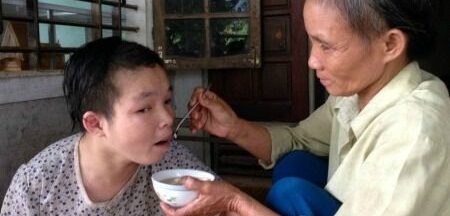
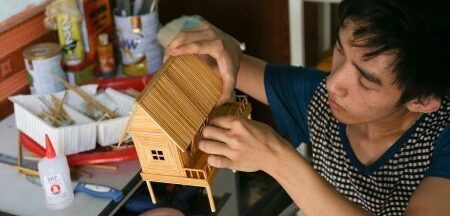
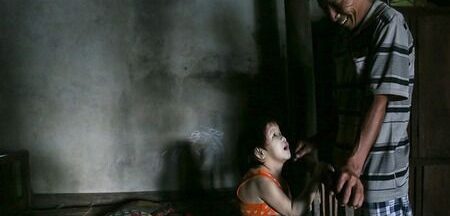
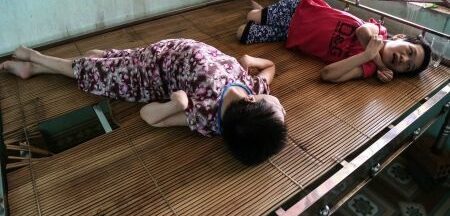
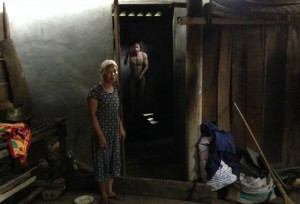

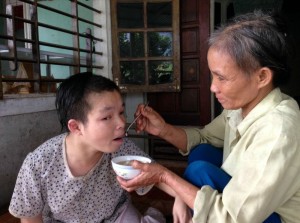
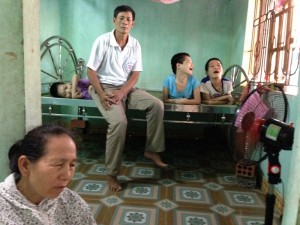
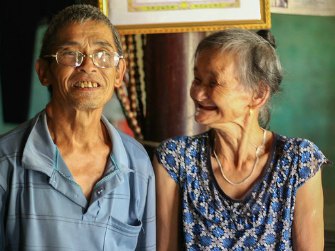
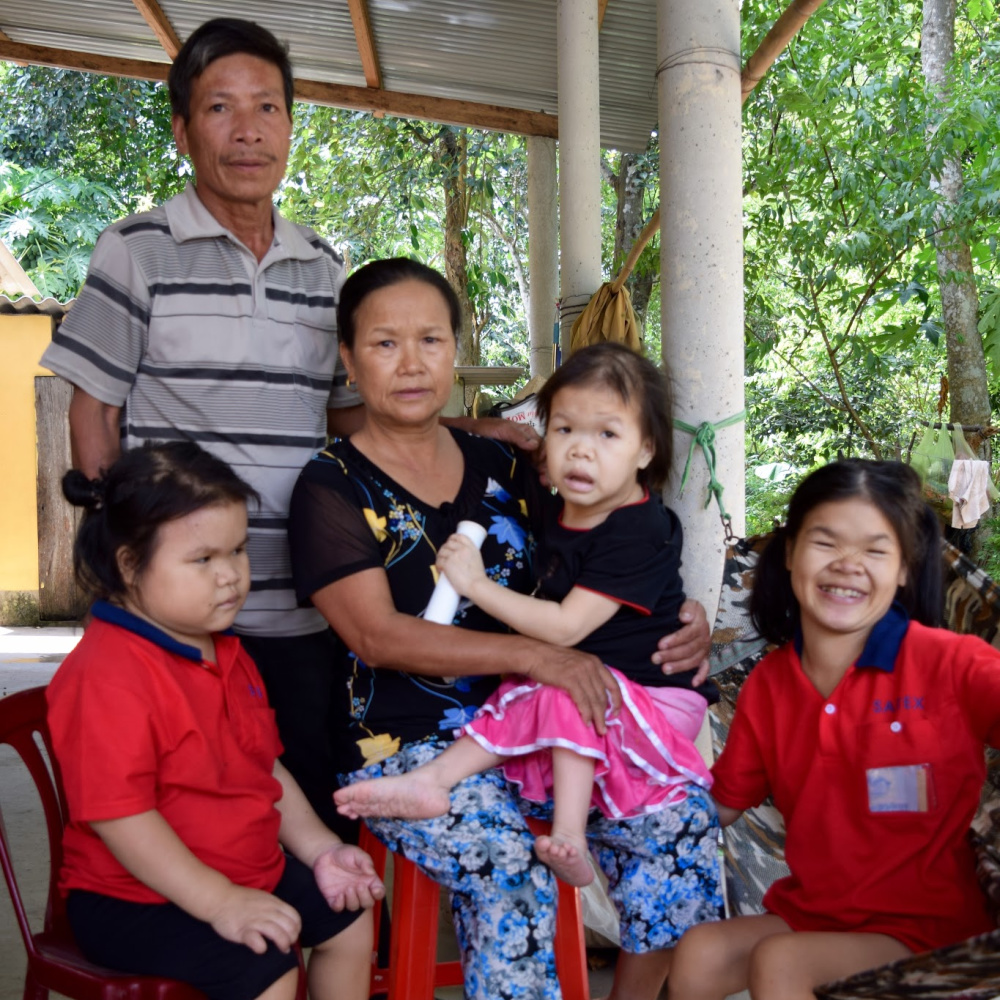
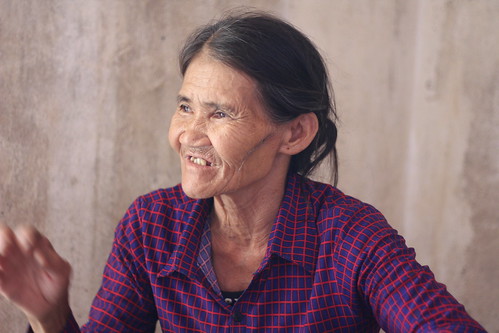
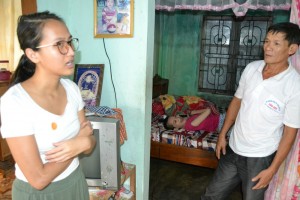 June 2016: AP raises $3,300 for Agent Orange caregivers.
June 2016: AP raises $3,300 for Agent Orange caregivers.